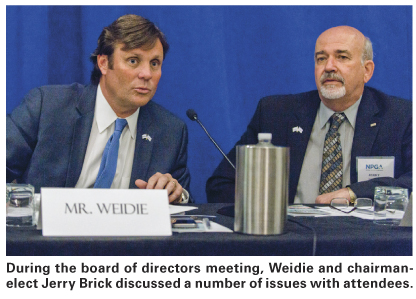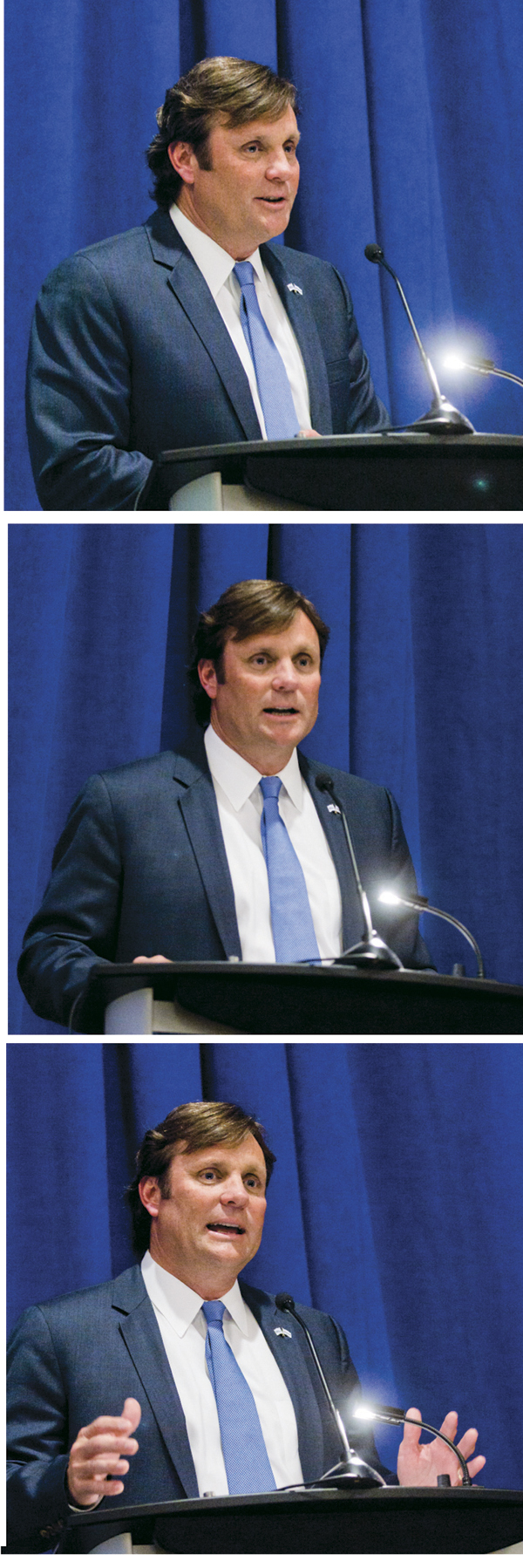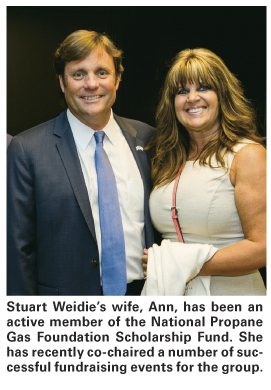Wednesday, July 13, 2016
Stuart Weidie, president and CEO of Blossman Gas (Ocean Springs, Miss.), was sworn in as chairman of the board of the National Propane Gas Association (NPGA) on May 23, 2016, in Washington, D.C. He laid out various goals for his term, including development of additional energy infrastructure and enactment of legislation to ensure that propane is not exported during emergency situations.

After taking office along with a new slate of officers ahead of Propane Days, Weidie addressed attendees at the association’s board meeting and listed three goals that he described as “general objectives, but they need to be transferred into specific actionable items.”
He expanded on those goals in an interview with BPN after the meeting, listing his first goal as “identifying and advancing specific growth opportunities for propane.” He emphasized that he and NPGA want to ensure that propane water heaters — which he said have the lowest carbon footprint compared to water heaters that use other types of energy — are thought of favorably compared to electricity.
Carbon labeling of appliances based on the full fuel cycle analysis, from the energy source to the customer’s home, is part of that first goal of identifying growth opportunities. Propane water heaters are an example of a product that compares favorably to electricity when the full fuel cycle analysis is used, Weidie noted.
“We have to ensure that the knowledge to sell those water heaters is within the grasp of our local marketers in local communities,” stated Weidie, who is also president of nationwide autogas fueling and vehicle network Alliance AutoGas.
Creating a favorable business environment for propane utilization is his second goal. That would include advocating against legislation and activity that is unfavorable to the industry. As an example, Weidie noted the natural gas industry’s efforts to expand into traditional rural propane territory (BPN June 2016), and the propane industry’s efforts against that expansion are helping create a more favorable business environment. But the fight must occur at the state level, he explained, and that involves a joint effort between NPGA and the state associations that serve the affected areas.
Work to repeal Section 433 of the Energy Independence and Security Act of 2007 is another example of the propane industry’s efforts to create a more favorable business environment. Section 433, listed as “federal building energy efficiency performance standards,” bans fossil fuels in federal businesses after 2030. The act, which seeks “to move the United States toward greater energy independence and security,” boosts production of renewable fuels and increases efficiency of products, buildings, and vehicles. “We want to repeal section 433, which eliminates the ability of propane to be used in any federal building after that time,” Weidie stated.
Creating increased energy infrastructure and development is Weidie’s third goal. He and NPGA want to ensure propane is a reliable energy source, even in the most difficult weather conditions. The association is working on introducing legislation, tentatively titled the Emergency Energy Act, which would help ensure propane is used in areas of the country that need it during extreme weather situations and not exported to other countries. The legislation would help prevent supply shortage situations such as the one that occurred in winter 2013-2014.
“We’re not against exports, but when we’re in critical periods, we don’t want senior citizens freezing because we can’t get propane to them and at the same time exporting our domestically produced fuel source to Asia or South America,” Weidie noted, adding that the planned legislation is still in the drafting stages. The association’s supply and logistics committee has been helping to prepare supporting data by measuring inventory levels in different PADD regions around the country. “We need to get our data and facts together, and that has been an 18-month process. Once we have credible analytics, then we can pursue legislation.”
Also related to Weidie’s third goal, he and the association will continue fighting for pipeline transparency. That includes information shippers can use to “make good decisions to ensure we have a reliable supply of propane going through the pipelines,” he stated.
Increased Involvement Throughout the Years
Weidie is used to setting goals and meeting them. After spending four years as a minor league baseball player in the Boston Red Sox organization, he earned his bachelor’s and master’s degrees and in 1991 joined Blossman Gas, the business of his stepfather, John Blossman. Weidie called his first four years in the Blossman Gas training program “one of the most enjoyable times in my career to date.” He installed appliances and discovered he had a strong aptitude for the service side of the business.
“Working on appliances the first several years I was in the business gave me a great background from a technical standpoint of what the business is really about,” he stated. “It’s not in an office, but out in the field where the customer is.” His responsibilities with the company increased, and he was named president in 2000 and president and CEO in 2005.
His propane industry involvement increased around 2003, when he began serving as chair of the Research and Development Advisory Committee for the Propane Education & Research Council (PERC). He served in that role until 2010. Around 2005 he also became more active in NPGA, joining the board of directors, and serving as chair of the Governmental Affairs Committee for about three years. He remains a big supporter of the committee, noting its various contributions over the years and adding that it was instrumental in getting alternative-fuel vehicle tax credits enacted and helping lift the consumer education restrictions on PERC.
During Weidie’s tenure on the committee, NPGA officers Carl Hughes and Ray Murray asked if he would be interested in serving as treasurer of the association, the first step in moving up the ranks of the executive team at NPGA before becoming chair.
Another Goal: Integrated Growth
An integrated growth strategy involving NPGA, PERC, and the state propane gas associations is another objective for Weidie in his position as NPGA chair. Defining and agreeing upon common objectives for the three groups to work together will ensure that each organization “pursues the objectives and tactics necessary to help our industry become stronger and more prosperous.” An enhanced communications strategy is one of those tactics, and Weidie believes that although the state associations communicate well to their members, an integrated communication between the three groups is necessary.
He notes that propane is the “safest, cleanest fossil fuel known to man.” It is an energy source that can be used anywhere, and the products that use it are of the highest quality. He challenges anyone to find an electric gas log that runs better than a propane log, or a water heater fueled by another energy source that can fill a bathtub as well and is better for the environment than one fueled by propane. But the industry needs data to support that message.
“PERC has to conduct the research to quantify the carbon reductions with our products, whether it’s in a school bus, water heater, gas dryer, or high-efficiency propane furnace,” Weidie stated. “NPGA needs to use that data to get good public policy accomplished. Carbon labeling of appliances is the example I spoke of earlier. And the states need to use that data to educate marketers so they can talk in an educated and knowledgeable manner to the potential customers of our industry.”
He noted during his presentation in Washington, D.C. that people in society should stop looking to others to fix their problems rather than taking personal responsibility to improve their own lives. Along those same lines, he noted that propane marketers should not expect NPGA and PERC to do the work for them to grow their businesses. But for marketers, PERC and NPGA can create tools they can use to help them communicate propane’s benefits.
“Integrated objectives and improved and enhanced communications throughout the industry: That’s really what I’m focusing on in the coming year,” he stated. Webinars might be one method of communication, but not necessarily e-mail. “We’ve got to have quality tools with rich content that can be utilized by states in face-to-face meetings, in Webinars or conference calls at times, but dissemination of information is basic stuff and not overly complicated. We’ve got to do more than e-mail. We’ve got to utilize all available tools we’ve got to disseminate information.”
Weidie is proud to be associated with the propane industry, calling its members and customers independent, self-sufficient, resilient, and hard working. But that independence and self-sufficiency must extend to informing the public about the virtues of propane.
“We should be proud about propane, and we should be proud to be associated with the people and products we have. I am. We should take pride in the great things we have to offer to consumers and potential customers out in the marketplace.”
—Daryl Lubinsky

After taking office along with a new slate of officers ahead of Propane Days, Weidie addressed attendees at the association’s board meeting and listed three goals that he described as “general objectives, but they need to be transferred into specific actionable items.”
He expanded on those goals in an interview with BPN after the meeting, listing his first goal as “identifying and advancing specific growth opportunities for propane.” He emphasized that he and NPGA want to ensure that propane water heaters — which he said have the lowest carbon footprint compared to water heaters that use other types of energy — are thought of favorably compared to electricity.
Carbon labeling of appliances based on the full fuel cycle analysis, from the energy source to the customer’s home, is part of that first goal of identifying growth opportunities. Propane water heaters are an example of a product that compares favorably to electricity when the full fuel cycle analysis is used, Weidie noted.
“We have to ensure that the knowledge to sell those water heaters is within the grasp of our local marketers in local communities,” stated Weidie, who is also president of nationwide autogas fueling and vehicle network Alliance AutoGas.

Creating a favorable business environment for propane utilization is his second goal. That would include advocating against legislation and activity that is unfavorable to the industry. As an example, Weidie noted the natural gas industry’s efforts to expand into traditional rural propane territory (BPN June 2016), and the propane industry’s efforts against that expansion are helping create a more favorable business environment. But the fight must occur at the state level, he explained, and that involves a joint effort between NPGA and the state associations that serve the affected areas.
Work to repeal Section 433 of the Energy Independence and Security Act of 2007 is another example of the propane industry’s efforts to create a more favorable business environment. Section 433, listed as “federal building energy efficiency performance standards,” bans fossil fuels in federal businesses after 2030. The act, which seeks “to move the United States toward greater energy independence and security,” boosts production of renewable fuels and increases efficiency of products, buildings, and vehicles. “We want to repeal section 433, which eliminates the ability of propane to be used in any federal building after that time,” Weidie stated.
Creating increased energy infrastructure and development is Weidie’s third goal. He and NPGA want to ensure propane is a reliable energy source, even in the most difficult weather conditions. The association is working on introducing legislation, tentatively titled the Emergency Energy Act, which would help ensure propane is used in areas of the country that need it during extreme weather situations and not exported to other countries. The legislation would help prevent supply shortage situations such as the one that occurred in winter 2013-2014.
“We’re not against exports, but when we’re in critical periods, we don’t want senior citizens freezing because we can’t get propane to them and at the same time exporting our domestically produced fuel source to Asia or South America,” Weidie noted, adding that the planned legislation is still in the drafting stages. The association’s supply and logistics committee has been helping to prepare supporting data by measuring inventory levels in different PADD regions around the country. “We need to get our data and facts together, and that has been an 18-month process. Once we have credible analytics, then we can pursue legislation.”
Also related to Weidie’s third goal, he and the association will continue fighting for pipeline transparency. That includes information shippers can use to “make good decisions to ensure we have a reliable supply of propane going through the pipelines,” he stated.
Increased Involvement Throughout the Years
Weidie is used to setting goals and meeting them. After spending four years as a minor league baseball player in the Boston Red Sox organization, he earned his bachelor’s and master’s degrees and in 1991 joined Blossman Gas, the business of his stepfather, John Blossman. Weidie called his first four years in the Blossman Gas training program “one of the most enjoyable times in my career to date.” He installed appliances and discovered he had a strong aptitude for the service side of the business.
“Working on appliances the first several years I was in the business gave me a great background from a technical standpoint of what the business is really about,” he stated. “It’s not in an office, but out in the field where the customer is.” His responsibilities with the company increased, and he was named president in 2000 and president and CEO in 2005.
His propane industry involvement increased around 2003, when he began serving as chair of the Research and Development Advisory Committee for the Propane Education & Research Council (PERC). He served in that role until 2010. Around 2005 he also became more active in NPGA, joining the board of directors, and serving as chair of the Governmental Affairs Committee for about three years. He remains a big supporter of the committee, noting its various contributions over the years and adding that it was instrumental in getting alternative-fuel vehicle tax credits enacted and helping lift the consumer education restrictions on PERC.
During Weidie’s tenure on the committee, NPGA officers Carl Hughes and Ray Murray asked if he would be interested in serving as treasurer of the association, the first step in moving up the ranks of the executive team at NPGA before becoming chair.
Another Goal: Integrated Growth
An integrated growth strategy involving NPGA, PERC, and the state propane gas associations is another objective for Weidie in his position as NPGA chair. Defining and agreeing upon common objectives for the three groups to work together will ensure that each organization “pursues the objectives and tactics necessary to help our industry become stronger and more prosperous.” An enhanced communications strategy is one of those tactics, and Weidie believes that although the state associations communicate well to their members, an integrated communication between the three groups is necessary.

He notes that propane is the “safest, cleanest fossil fuel known to man.” It is an energy source that can be used anywhere, and the products that use it are of the highest quality. He challenges anyone to find an electric gas log that runs better than a propane log, or a water heater fueled by another energy source that can fill a bathtub as well and is better for the environment than one fueled by propane. But the industry needs data to support that message.
“PERC has to conduct the research to quantify the carbon reductions with our products, whether it’s in a school bus, water heater, gas dryer, or high-efficiency propane furnace,” Weidie stated. “NPGA needs to use that data to get good public policy accomplished. Carbon labeling of appliances is the example I spoke of earlier. And the states need to use that data to educate marketers so they can talk in an educated and knowledgeable manner to the potential customers of our industry.”
He noted during his presentation in Washington, D.C. that people in society should stop looking to others to fix their problems rather than taking personal responsibility to improve their own lives. Along those same lines, he noted that propane marketers should not expect NPGA and PERC to do the work for them to grow their businesses. But for marketers, PERC and NPGA can create tools they can use to help them communicate propane’s benefits.
“Integrated objectives and improved and enhanced communications throughout the industry: That’s really what I’m focusing on in the coming year,” he stated. Webinars might be one method of communication, but not necessarily e-mail. “We’ve got to have quality tools with rich content that can be utilized by states in face-to-face meetings, in Webinars or conference calls at times, but dissemination of information is basic stuff and not overly complicated. We’ve got to do more than e-mail. We’ve got to utilize all available tools we’ve got to disseminate information.”
Weidie is proud to be associated with the propane industry, calling its members and customers independent, self-sufficient, resilient, and hard working. But that independence and self-sufficiency must extend to informing the public about the virtues of propane.
“We should be proud about propane, and we should be proud to be associated with the people and products we have. I am. We should take pride in the great things we have to offer to consumers and potential customers out in the marketplace.”
—Daryl Lubinsky

